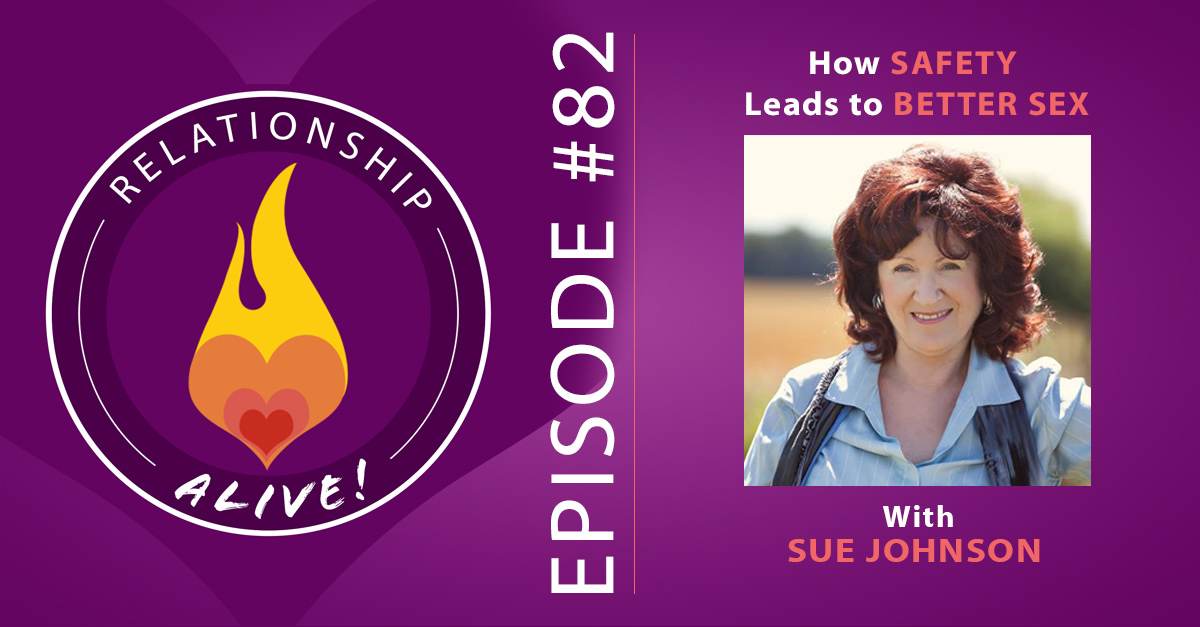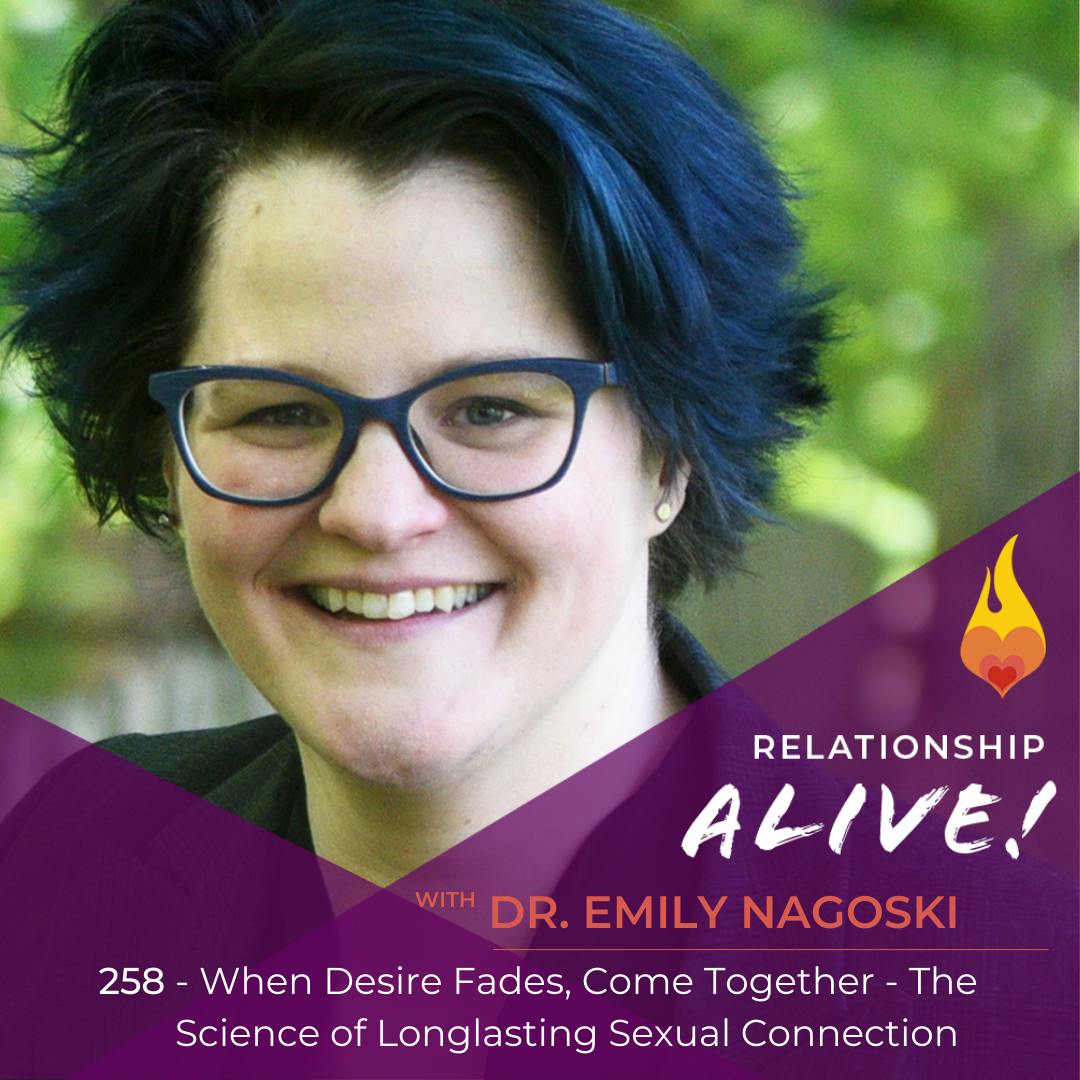How do you have better, more passionate, more connected sex with your partner? If you’re looking for information about how to deepen your sensual connection so that things actually improve over time - then you’ve come to the right place! Today’s episode features Sue Johnson, creator of Emotionally-Focused Therapy (EFT), and author of several best-selling books on how to do relationships well, including Hold Me Tight. Sue’s work masterfully blends attachment theory with how to thrive in partnership - and she’s here today to talk about how knowing your partner more deeply, and building safety, can create deep passion in the bedroom.
(You also may recall Sue Johnson’s first visit to the Relationship Alive podcast in Episode 27 - Breaking Free from Your Patterns of Conflict.)
The theory and science of relationships has not really looked at sexuality. Newer research is finally beginning to look at sex in the context of relationships. Of course sex can be recreational, but the vast majority of people are experiencing sexuality in the context of long term relationship - and thus this context should be included in our studies. It is as if we are only now beginning to see the whole picture and are able to create a map to help us understand how sexuality impacts, and is impacted by our knowledge about love and attachment bonding.
Sex is a conversation by other means. Think of sex as a conversation. If asked who you would have a better conversation with: 1) someone you feel safe and connected or 2) a stranger, most people would say option 1. This is true in sex as well. We have gotten caught up in a false idea that “the known” is less fulfilling, but this simply is not substantiated.
Myth: Familiarity is going to kill desire. In terms of sexuality we have become caught up in this idea that familiarity is going to kill desire and that feeling safe and connected is a disadvantage - but this is a cliche and there is no supportive research. Johnson explains that in fact, “what we know... is that the people who report have the best and most frequent sex, and find it the most thrilling, are people in long term relationships.” Research is showing more and more that the comfort and connection that happens in secure bonding adds to sense of eroticism.
There is a distinction between a sense of familiarity where people are just tired of each other and not really connecting, versus what happens when you are actually safe and fully alive and present and connected with each other. Understanding this difference is critical to relationships! We know that the most basic element in secure emotional bonding is emotional responsiveness. When a secure bond is present there is emotional openness, accessibility, responsiveness, and engagement. Intimacy develops because people who have secure attachment are able to find and create deeper moments of connection.
ARE- Accessibility + Responsiveness + Engagement. The million dollar question in relationships is “Are you there for me?”. ARE is the answer to this question. Having a connection with your partner in which you are both showing signs of ARE results in a stronger bond, and better sex.
Novelty: What is novelty? Novelty occurs when there is a sense of longing, erotic play, spontaneity, and attunement in a relationship. The ability to play arises when connection is met with a sense of attunement. If you are really engaged with somebody and open to being spontaneous with them, you will find that every time you interact together there is a level of novelty! This is true because ultimate intimacy is unattainable - the closer you get to somebody the more you know that you can never know them and this tease becomes a spark for passion and eroticism!
Nature has found a way to shut-down habituation. Oxytocin, the bonding hormone, floods us with a sense of connection and belonging and shuts down habituation centers of brain. Habituation occurs when people are not engaged with each other, and/or are taking each other for granted. Habituation is what kills eroticism, not familiarity.
People who tend towards avoidantly attached patterns often have an external view of novelty - believing that sex will be boring unless there is a constant introduction of new toys, positions, behaviors, etc. Sex that relies on sensation and performance, however, leads to needing more and more to achieve sexual arousal. This becomes a negative cycle in which the other partner feels used, and disconnected.
Safety and thrill: In order to understand the importance of safety to the sensation of spontaneity and thrill, imagine yourself on a zipline. Likely, you would only be able to fully enjoy yourself if you trusted you were securely attached and that all safety measures were in place. In the same way, if you have a secure bond - safety can be a safe adventure, and play and spontaneity are possible! That said, if you want to turn your partner on, the very best thing you can do is to spend a few minutes talking to your partner, and helping each other feel connected. Remember: safety in your bonding is a prelude to great sex.
Falling in love again and again and again. The more we understand how sex and bonding are related, the more capability we have to reconnect with our partners and reignite a sense of passion. Knowing how to do this means that passion might not have an expiration date!
What to do when things feel dull? The irony is that despite sexuality being ubiquitously displayed in the media and in the public, it is often missing in our intimate conversations. The best thing you can do to move out of habituation and boredom is to openly speak about sex with your partner. Talk about what really turns you on: what you like and what you don’t like. Expand the conversation to include not only what turns you on in the bedroom, but what turns you on in everyday life as well!
The secret is in the connection and flow between us. Look at the big picture: What is happening in the bedroom is more than likely an extension of the rest of your relationship - how much sensual connection do you experience throughout the day? Look at everything in context - how do you dance together? Imagine yourself dancing without music - it just doesn’t have that passionate flow we all enjoy so much. Attunement and connection is the music that fires up our sexual interactions and makes our passionate encounters multi-dimensional.
Jealousy: Jealousy is the result of a deep sense of threat. It occurs when we become worried that our partner is giving their attention and interested in someone else that makes them turn away from us. One of the reasons that affairs are so threatening is that it threatens the bond that is core to who we are in relationship. The search and craving for emotional connection is one of the most powerful instincts in our species, and therefore, any threat to this bond is registered and felt as dangerous and potentially life-threatening. There is truth and science to this in the sense that emotional isolation is a risk factor for every illness and disease that we know of.
Bowlby’s 3 needs in adult relationships: John Bowlby explains that the three core needs in adult relationships are 1) bonding and attachment, 2) sexuality, and 3) caretaking. The attachment is the most basic core level and it defines the other two. It is primary in the sense that while you can live without an orgasm, you cannot live well without emotional connection and affection. We have too narrowly defined sex as performance and sensation - leading us to a disconnected sense of lovemaking that leaves us unfulfilled.
Unfulfilled? Unsatisfied? Stuck? Wondering how to break free from a flat or unhealthy pattern of sexuality that you may have become habituated to? Invite in the findings from new bonding science that correlates emotional connection with fulfilling sex lives. Be willing to look at the whole picture - placing your lovemaking within the context of your relationship.
Remember to re-establish safety with your partner before jumping into the details about your sex life. This may, for some of you, require involving a therapist- and if so, do! For others this may mean becoming clear that the intention of the conversations you are seeking are about connection and understand, versus shaming, blaming, or judging.
Once you have re-established a safe container for this conversation, begin to notice, together, your unique sexual dance. Ask yourselves and each other what patterns are present. What steps are taken to initiate sex? Who does what, and when? Use action verbs! What emotional music is playing (or not playing) in the background of your sensual lives together? With safety you can be free to become curious and vulnerable and to begin to look openly, engage, and share on a deep and intimate level about your sexuality. You can begin to explore what great sex is for each of you. You can share your fantasies! You can play and be spontaneous! You can discover and relearn what excites you! Be open to being surprised by yourself, and each other! A great lasting relationship and a great erotic life together awaits.
Resources:
Read Sue Johnson’s book Love Sense and Hold Me Tight
Check out Sue Johnson’s website for videos, resources, and upcoming events
Sue Johnson’s talk at the Psychotherapy Networker on Attachment and Sex
https://www.neilsattin.com/sue2 Visit to download the show guide, or text “PASSION” to 33444 and follow the instructions to download the show guide to this episode with Sue Johnson
Our Relationship Alive Community on Facebook
Amazing intro/outro music graciously provided courtesy of:
The Railsplitters - Check them Out


